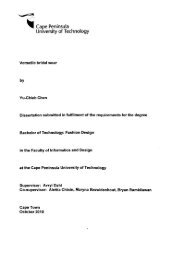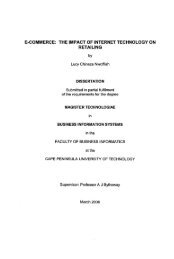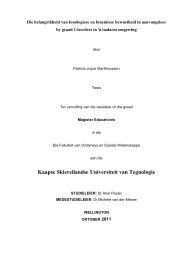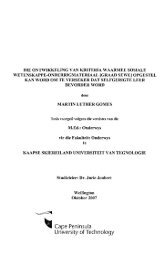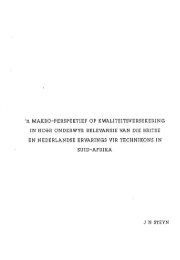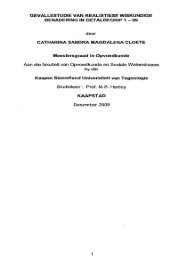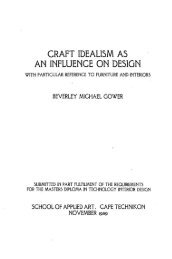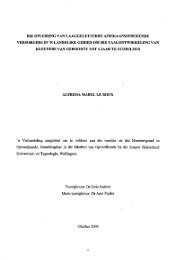an investigative analysis of the psychological characteristics and job ...
an investigative analysis of the psychological characteristics and job ...
an investigative analysis of the psychological characteristics and job ...
You also want an ePaper? Increase the reach of your titles
YUMPU automatically turns print PDFs into web optimized ePapers that Google loves.
2.3.11 Efficient<br />
Efficiency is defined by Gibson, et al. (1994:41) as <strong>the</strong> ratio <strong>of</strong>oulputs to inputs.<br />
The eEL should be efficient because students <strong>an</strong>d employers rely on him for a certain amount <strong>of</strong><br />
oulput. Efficient CELs are able to acquire more work stations for students <strong>an</strong>d place <strong>the</strong>se students<br />
more efficien6y according to <strong>the</strong>ir <strong>an</strong>d <strong>the</strong> employer's needs.<br />
.Efficient m<strong>an</strong>agement <strong>of</strong> time <strong>an</strong>d use <strong>of</strong> available resources are also import<strong>an</strong>t<br />
2.3.12 Empathic<br />
According to Armstrong (1996:772), empathy is <strong>the</strong> ability to put oneself in <strong>the</strong> o<strong>the</strong>r party's shoes<br />
to underst<strong>an</strong>d not only what <strong>the</strong>y are hoping to achieve but also why <strong>the</strong>y have <strong>the</strong>se expectations<br />
<strong>an</strong>d <strong>the</strong> extent to which <strong>the</strong>y are detennined to fulfil <strong>the</strong>m.<br />
Nelson-Jones (2003:30) defines empathy as <strong>the</strong> capacity to identify oneself mentally with <strong>the</strong> o<strong>the</strong>r<br />
person <strong>an</strong>d to comprehend that person's inner wortd. Empathy is fur<strong>the</strong>r defined by Brewster,<br />
Carey, Dowling, Grobler, Holl<strong>an</strong>d <strong>an</strong>d Wamich (2003:49). They say it is a skill at sensing o<strong>the</strong>r<br />
people's emotions, underst<strong>an</strong>ding <strong>the</strong>ir perspective <strong>an</strong>d taking <strong>an</strong> active interest in <strong>the</strong>ir concerns.<br />
Ashcr<strong>of</strong>l <strong>an</strong>d Forem<strong>an</strong>-Peck (1994:130) state that having empathy implies that <strong>the</strong> CEl should<br />
creatively imagine himself in his studenfs shoes, so that he c<strong>an</strong> think <strong>the</strong> way <strong>the</strong> student thinks<br />
<strong>an</strong>d experience <strong>the</strong> wortd as he does.<br />
Cox (1994:51) adds that if <strong>the</strong> ca c<strong>an</strong> develop <strong>an</strong>d maintain empathy with his students, it is one<br />
<strong>of</strong> <strong>the</strong> most powerful tools for communication he will have. Rostron (2002:241) elaborates by<br />
explaining that a combination <strong>of</strong> empathy, <strong>an</strong> awareness <strong>of</strong> o<strong>the</strong>rs' feelings <strong>an</strong>d needs. <strong>an</strong>d social<br />
skill all help to produce a desirable response in o<strong>the</strong>rs <strong>an</strong>d help <strong>the</strong> CEl to collaborate, co-operate<br />
<strong>an</strong>d develop rapport<br />
36




